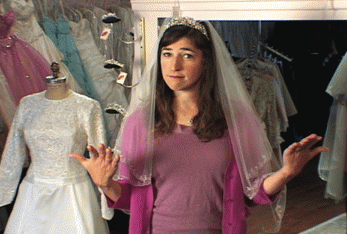My guest today is Chicago filmmaker, Beverly Siegel. Welcome to OpEdNews, Bev.
JB: Your 2011 documentary, Women Unchained , is getting a lot of attention. Its topic is the agunah, an Orthodox Jewish woman whose husband has refused to give her a "get', a Jewish divorce. What initially drew you to this topic?
BS: A friend of mine has a daughter whose marriage had broken down, but she couldn't get a "get' from her husband. My friend tried to enlist the aid of friends, relatives, community members and rabbis -- to encourage the son-in-law to obtain the "get' -- but nothing worked. In frustration, Ariel sought and received an annulment from Rabbi Emanuel Rackman, who had set up a rabbinical court to free women from this awful trap. (According to Jewish law, without a "get,' a woman -- even if she has a secular divorce -- can't remarry.
If she flouts this restriction and remarries civilly, her future children will be stigmatized as "mamzerim,' illegitimate, and they will be severely limited in their marriage options.) The annulment, however, wasn't recognized by other Orthodox rabbis, so Ariel still couldn't remarry without stigmatizing her future children. In the end, Ariel's "get' cost my friend close to a half-million dollars in assorted pay-offs to her son-in-law. Following this ordeal, my friend and her husband were adamant to expose this not-uncommon abuse of the power imbalance in Jewish law. They asked me to take on the topic in a documentary. And so the fundraising began.
JB: Speaking of fundraising, was it difficult to raise money for this project? Did you get any pressure not to pursue this because it reflects poorly on the Orthodox establishment?
BS: Let's put it like this. It wasn't easy to raise the funds, and the funds we raised didn't come close to covering the cost of production. But thank goodness we managed to finish. No, we didn't experience any pressure to drop to the project. Some people were appalled, though, that we were doing it. They said things like, "You'd actually show that to people!," but we never took it seriously.
JB: Traditionally, a husband refusing to grant his wife a "get' would risk being ostracized by the community at large. And that would be enough to motivate him to do what he was not eager to do. Does community pressure no longer play a role in the "get' dance? And, if not, why not? You would think that a man would want to cherish and protect his good name among his friends and neighbors.
BS: I can't say community pressure doesn't play ANY role in motivating a husband to give a 'get' but it's limited. An organization called ORA (Organization for the Resolution of Agunot) utilizes community pressure -- in the form of large demonstrations outside the homes and offices of 'get' withholders -- and they've been spectacularly successful in some cases at shaming 'gets' out of recalcitrant husbands. But community pressure alone is inadequate.
The case of Tamar Epstein and Aaron Friedman illustrates the point. A seruv (contempt of court) citation has been issued against Friedman, who is a top aide for Rep. Dave Camp (R-MI), Chairman of the House Ways and Means Committee. Friedman's been denounced repeatedly from the pulpit [by Orthodox Rabbi Shmuel Herzfeld of Ohav Shalom National Synagogue] in Washington D.C.; and ORA has mounted large demonstrations at his workplace, all to no avail. Rep. Camp is aware of Friedman's pariah status in the Jewish world, but hasn't pressured him to comply with Jewish community norms. Bottom line: Friedman keeps his job, and Epstein is still an agunah, despite community pressure.
JB: What a heartbreaking story. While certainly no one goes into a marriage planning for its demise, divorce is undeniably on the rise, even in the Orthodox community. It's important to be practical. How can engaged couples be pro-active so that they don't end up in a similar situation?
BS: Anyone who enters into a marriage valid under Jewish law needs to sign an approved pre-nuptial agreement. I recommend the downloadable pre-nup that is on the Beit Din of America website. The pre-nup provides a strong disincentive to withholding a 'get' by imposing a fine of about $150 per day as long as the marriage is still valid (i.e., no 'get' has been given. Important to note: couples should check the box that allows the Beit Din authority only over the 'get' and not the other financial aspects of the settlement.)
The beauty of the pre-nup is that it's enforceable in civil court, which is what gives it real teeth, and it's "kosher" under Jewish law. It also provides disincentive for a woman to refuse to accept a 'get,' because if she does refuse, she loses the protection it provides. Synagogues and especially Jewish women's organizations should sponsor educational programming on the subject for the benefit of their members and their daughters. Women Unchained, which is available through the National Center for Jewish Film (781-736-8600 or www.jewishfilm.org), is a useful trigger film for the discussion!
JB: That sounds like a valid option, Bev. How did this pre-nup come about? I'm sure it's been years in the making. Is it recognized by all Orthodox rabbis?
BS: The problem isn't that some Orthodox rabbis don't recognize the pre-nup. The real question is, is it required or endorsed by all Orthodox rabbis, and to that the answer is no. Members of the International Rabbinic Fellowship face sanctions by their professional association if they officiate at a marriage without a pre-nup. The Rabbinical Association of America strongly encourages their member to use the pre-nup, but they don't sanction members who refuse to require it. About one-third of RCA members won't perform a marriage without a pre-nup. Beyond that, it's uncharted territory, which is why grassroots education is essential.
(Note: You can view every article as one long page if you sign up as an Advocate Member, or higher).







